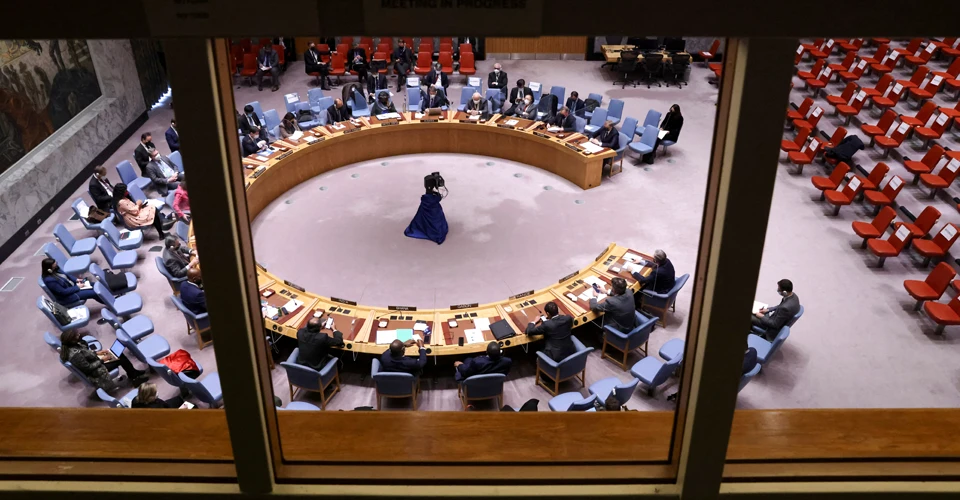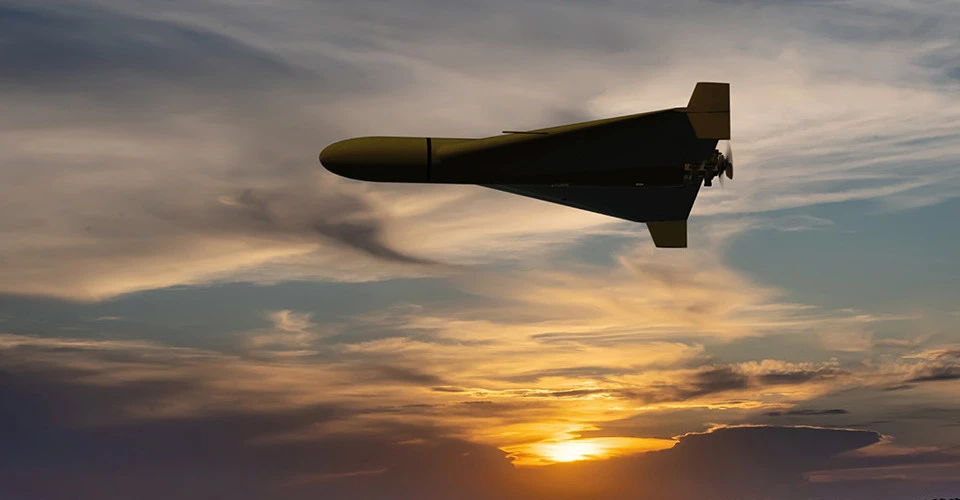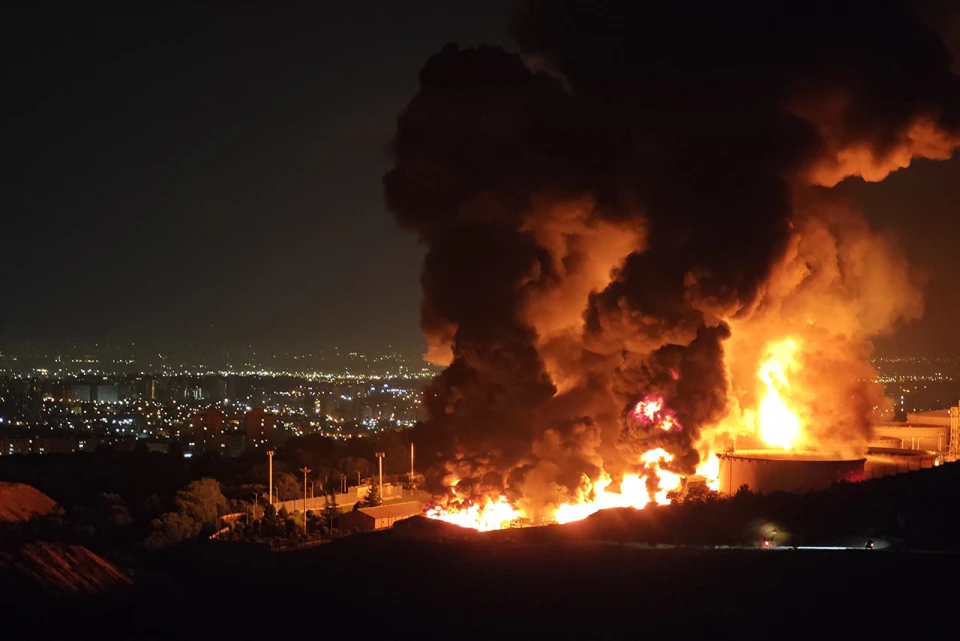Russia backs Iran with words, not weapons, amid conflict with Israel and U.S.
global.espreso.tv
Fri, 27 Jun 2025 17:11:00 +0300

As tensions soared in the Middle East following Israeli and U.S. strikes on Iranian nuclear facilities, Russia offered strong verbal and diplomatic support to Tehran but refrained from taking any military action—a calculated stance underscoring Moscow’s geopolitical balancing act.The Kremlin swiftly condemned the strikes, calling them “irresponsible” and “a flagrant violation of international law.” President Vladimir Putin personally labeled the attacks “unprovoked” and “unjustified.” Russia’s Foreign Ministry echoed those sentiments, backing Iran’s right to develop peaceful nuclear energy and dismissing Western claims of Iranian nuclear weapons ambitions.In a pointed warning, Russian officials—most notably the head of Rosatom—raised alarms over the potential for a “nuclear catastrophe” akin to Chernobyl if the Bushehr nuclear plant were attacked. Russia underscored the danger to its own technicians working on-site in Iran.Alongside China and Pakistan, Russia submitted a draft resolution at the UN Security Council calling for an immediate ceasefire and urging all sides to return to the negotiating table.  Putin also hosted Iranian Foreign Minister Abbas Araghchi in Moscow, promising efforts to “assist the people of Iran.” Yet the meeting produced no joint declaration or tangible military support.This limited response comes despite the two countries signing a 20-year Comprehensive Strategic Partnership Agreement in January 2025, intended to deepen political, economic, and military cooperation. Crucially, the deal omitted any mutual defense commitments—leaving Russia under no formal obligation to aid Iran militarily.Iran has provided Russia with critical military technology, including Shahed drones used extensively in Ukraine, and earlier this year, Tehran agreed to supply ballistic missiles. Still, Russia’s reciprocation during Iran’s time of need was notably restrained.
Putin also hosted Iranian Foreign Minister Abbas Araghchi in Moscow, promising efforts to “assist the people of Iran.” Yet the meeting produced no joint declaration or tangible military support.This limited response comes despite the two countries signing a 20-year Comprehensive Strategic Partnership Agreement in January 2025, intended to deepen political, economic, and military cooperation. Crucially, the deal omitted any mutual defense commitments—leaving Russia under no formal obligation to aid Iran militarily.Iran has provided Russia with critical military technology, including Shahed drones used extensively in Ukraine, and earlier this year, Tehran agreed to supply ballistic missiles. Still, Russia’s reciprocation during Iran’s time of need was notably restrained. Several factors that explain the Kremlin’s cautionFocus on Ukraine: Russia remains overwhelmingly centered on its "special military operation" in Ukraine. It cannot afford to divert significant military resources, such as missiles or air defense systems, to another major conflict, especially one involving the U.S.No mutual defense clause: As mentioned, the 2025 strategic partnership agreement with Iran did not include a mutual defense clause. Russia explicitly stated that Iran had not requested air defense assistance, and even if it had, Russia's capacity is constrained.Balancing act: Russia seeks to maintain a delicate balance in the Middle East, including maintaining some level of relations with Israel (which has a significant Russian-speaking diaspora) and avoiding direct confrontation with the U.S. While it aims to exploit anti-American sentiment in the Global South, it also prioritizes normalizing relations with the Trump administration.Limited leverage: Some analysts suggest that Russia lacks the leverage or mechanisms to effectively pressure Iran or mediate the conflict directly.Self-sufficiency in attack drones: While Iran was initially crucial for drone supplies, Russia has made significant gains in domestic drone production (including localizing Shahed manufacturing) by 2025, reducing its dependence on Iranian imports. This likely lessened the immediate pressure to reciprocate military aid.Ultimately, Russia’s support for Iran in this conflict was more symbolic than substantive. While Moscow amplified anti-Western narratives and positioned itself as a peace broker, it stopped well short of matching Tehran’s past military assistance with anything beyond words. That restraint, sources suggest, has left Tehran frustrated, hoping for more robust backing from its wartime partner.Iran feels betrayed as Russia offers only rhetoric As the dust settles from the 2025 conflict between Iran, Israel, and the U.S., Tehran is voicing quiet but growing anger at Moscow—its so-called strategic partner—for failing to deliver meaningful support when it mattered most.
Several factors that explain the Kremlin’s cautionFocus on Ukraine: Russia remains overwhelmingly centered on its "special military operation" in Ukraine. It cannot afford to divert significant military resources, such as missiles or air defense systems, to another major conflict, especially one involving the U.S.No mutual defense clause: As mentioned, the 2025 strategic partnership agreement with Iran did not include a mutual defense clause. Russia explicitly stated that Iran had not requested air defense assistance, and even if it had, Russia's capacity is constrained.Balancing act: Russia seeks to maintain a delicate balance in the Middle East, including maintaining some level of relations with Israel (which has a significant Russian-speaking diaspora) and avoiding direct confrontation with the U.S. While it aims to exploit anti-American sentiment in the Global South, it also prioritizes normalizing relations with the Trump administration.Limited leverage: Some analysts suggest that Russia lacks the leverage or mechanisms to effectively pressure Iran or mediate the conflict directly.Self-sufficiency in attack drones: While Iran was initially crucial for drone supplies, Russia has made significant gains in domestic drone production (including localizing Shahed manufacturing) by 2025, reducing its dependence on Iranian imports. This likely lessened the immediate pressure to reciprocate military aid.Ultimately, Russia’s support for Iran in this conflict was more symbolic than substantive. While Moscow amplified anti-Western narratives and positioned itself as a peace broker, it stopped well short of matching Tehran’s past military assistance with anything beyond words. That restraint, sources suggest, has left Tehran frustrated, hoping for more robust backing from its wartime partner.Iran feels betrayed as Russia offers only rhetoric As the dust settles from the 2025 conflict between Iran, Israel, and the U.S., Tehran is voicing quiet but growing anger at Moscow—its so-called strategic partner—for failing to deliver meaningful support when it mattered most. While Russia issued condemnations and backed diplomatic efforts at the UN, it refrained from any direct military involvement. This stance left Iran—despite supplying Russia with Shahed drones and reportedly ballistic missiles for use in Ukraine—without the air defense support or tactical aid it had hoped for.Iranian insiders now describe the alliance as one-sided. The 20-year strategic partnership agreement signed in January lacked a mutual defense clause, a legal omission that allowed Moscow to sit out the conflict. For many in Tehran, that omission now feels like a calculated loophole, shielding Russia from its obligations just as Iran faced a threat.Officials speaking to Reuters and Al Jazeera expressed clear frustration, saying requests for more substantial assistance were met with diplomatic gestures rather than action. The perceived betrayal is not new—Russia’s historic balancing act in the region, especially its ties with Israel, has long bred skepticism in Tehran.From Moscow’s perspective, involvement in another war—particularly one involving U.S. forces—would jeopardize its already stretched resources in Ukraine and risk destabilizing its broader relations in the Middle East. But for Iran, that reasoning only highlights the transactional nature of the relationship: one where support flows only when it serves Russian interests.As tensions simmer, Tehran is left questioning the value of a partnership that failed to deliver when it counted most.
While Russia issued condemnations and backed diplomatic efforts at the UN, it refrained from any direct military involvement. This stance left Iran—despite supplying Russia with Shahed drones and reportedly ballistic missiles for use in Ukraine—without the air defense support or tactical aid it had hoped for.Iranian insiders now describe the alliance as one-sided. The 20-year strategic partnership agreement signed in January lacked a mutual defense clause, a legal omission that allowed Moscow to sit out the conflict. For many in Tehran, that omission now feels like a calculated loophole, shielding Russia from its obligations just as Iran faced a threat.Officials speaking to Reuters and Al Jazeera expressed clear frustration, saying requests for more substantial assistance were met with diplomatic gestures rather than action. The perceived betrayal is not new—Russia’s historic balancing act in the region, especially its ties with Israel, has long bred skepticism in Tehran.From Moscow’s perspective, involvement in another war—particularly one involving U.S. forces—would jeopardize its already stretched resources in Ukraine and risk destabilizing its broader relations in the Middle East. But for Iran, that reasoning only highlights the transactional nature of the relationship: one where support flows only when it serves Russian interests.As tensions simmer, Tehran is left questioning the value of a partnership that failed to deliver when it counted most.
 Putin also hosted Iranian Foreign Minister Abbas Araghchi in Moscow, promising efforts to “assist the people of Iran.” Yet the meeting produced no joint declaration or tangible military support.This limited response comes despite the two countries signing a 20-year Comprehensive Strategic Partnership Agreement in January 2025, intended to deepen political, economic, and military cooperation. Crucially, the deal omitted any mutual defense commitments—leaving Russia under no formal obligation to aid Iran militarily.Iran has provided Russia with critical military technology, including Shahed drones used extensively in Ukraine, and earlier this year, Tehran agreed to supply ballistic missiles. Still, Russia’s reciprocation during Iran’s time of need was notably restrained.
Putin also hosted Iranian Foreign Minister Abbas Araghchi in Moscow, promising efforts to “assist the people of Iran.” Yet the meeting produced no joint declaration or tangible military support.This limited response comes despite the two countries signing a 20-year Comprehensive Strategic Partnership Agreement in January 2025, intended to deepen political, economic, and military cooperation. Crucially, the deal omitted any mutual defense commitments—leaving Russia under no formal obligation to aid Iran militarily.Iran has provided Russia with critical military technology, including Shahed drones used extensively in Ukraine, and earlier this year, Tehran agreed to supply ballistic missiles. Still, Russia’s reciprocation during Iran’s time of need was notably restrained. Several factors that explain the Kremlin’s cautionFocus on Ukraine: Russia remains overwhelmingly centered on its "special military operation" in Ukraine. It cannot afford to divert significant military resources, such as missiles or air defense systems, to another major conflict, especially one involving the U.S.No mutual defense clause: As mentioned, the 2025 strategic partnership agreement with Iran did not include a mutual defense clause. Russia explicitly stated that Iran had not requested air defense assistance, and even if it had, Russia's capacity is constrained.Balancing act: Russia seeks to maintain a delicate balance in the Middle East, including maintaining some level of relations with Israel (which has a significant Russian-speaking diaspora) and avoiding direct confrontation with the U.S. While it aims to exploit anti-American sentiment in the Global South, it also prioritizes normalizing relations with the Trump administration.Limited leverage: Some analysts suggest that Russia lacks the leverage or mechanisms to effectively pressure Iran or mediate the conflict directly.Self-sufficiency in attack drones: While Iran was initially crucial for drone supplies, Russia has made significant gains in domestic drone production (including localizing Shahed manufacturing) by 2025, reducing its dependence on Iranian imports. This likely lessened the immediate pressure to reciprocate military aid.Ultimately, Russia’s support for Iran in this conflict was more symbolic than substantive. While Moscow amplified anti-Western narratives and positioned itself as a peace broker, it stopped well short of matching Tehran’s past military assistance with anything beyond words. That restraint, sources suggest, has left Tehran frustrated, hoping for more robust backing from its wartime partner.Iran feels betrayed as Russia offers only rhetoric As the dust settles from the 2025 conflict between Iran, Israel, and the U.S., Tehran is voicing quiet but growing anger at Moscow—its so-called strategic partner—for failing to deliver meaningful support when it mattered most.
Several factors that explain the Kremlin’s cautionFocus on Ukraine: Russia remains overwhelmingly centered on its "special military operation" in Ukraine. It cannot afford to divert significant military resources, such as missiles or air defense systems, to another major conflict, especially one involving the U.S.No mutual defense clause: As mentioned, the 2025 strategic partnership agreement with Iran did not include a mutual defense clause. Russia explicitly stated that Iran had not requested air defense assistance, and even if it had, Russia's capacity is constrained.Balancing act: Russia seeks to maintain a delicate balance in the Middle East, including maintaining some level of relations with Israel (which has a significant Russian-speaking diaspora) and avoiding direct confrontation with the U.S. While it aims to exploit anti-American sentiment in the Global South, it also prioritizes normalizing relations with the Trump administration.Limited leverage: Some analysts suggest that Russia lacks the leverage or mechanisms to effectively pressure Iran or mediate the conflict directly.Self-sufficiency in attack drones: While Iran was initially crucial for drone supplies, Russia has made significant gains in domestic drone production (including localizing Shahed manufacturing) by 2025, reducing its dependence on Iranian imports. This likely lessened the immediate pressure to reciprocate military aid.Ultimately, Russia’s support for Iran in this conflict was more symbolic than substantive. While Moscow amplified anti-Western narratives and positioned itself as a peace broker, it stopped well short of matching Tehran’s past military assistance with anything beyond words. That restraint, sources suggest, has left Tehran frustrated, hoping for more robust backing from its wartime partner.Iran feels betrayed as Russia offers only rhetoric As the dust settles from the 2025 conflict between Iran, Israel, and the U.S., Tehran is voicing quiet but growing anger at Moscow—its so-called strategic partner—for failing to deliver meaningful support when it mattered most. While Russia issued condemnations and backed diplomatic efforts at the UN, it refrained from any direct military involvement. This stance left Iran—despite supplying Russia with Shahed drones and reportedly ballistic missiles for use in Ukraine—without the air defense support or tactical aid it had hoped for.Iranian insiders now describe the alliance as one-sided. The 20-year strategic partnership agreement signed in January lacked a mutual defense clause, a legal omission that allowed Moscow to sit out the conflict. For many in Tehran, that omission now feels like a calculated loophole, shielding Russia from its obligations just as Iran faced a threat.Officials speaking to Reuters and Al Jazeera expressed clear frustration, saying requests for more substantial assistance were met with diplomatic gestures rather than action. The perceived betrayal is not new—Russia’s historic balancing act in the region, especially its ties with Israel, has long bred skepticism in Tehran.From Moscow’s perspective, involvement in another war—particularly one involving U.S. forces—would jeopardize its already stretched resources in Ukraine and risk destabilizing its broader relations in the Middle East. But for Iran, that reasoning only highlights the transactional nature of the relationship: one where support flows only when it serves Russian interests.As tensions simmer, Tehran is left questioning the value of a partnership that failed to deliver when it counted most.
While Russia issued condemnations and backed diplomatic efforts at the UN, it refrained from any direct military involvement. This stance left Iran—despite supplying Russia with Shahed drones and reportedly ballistic missiles for use in Ukraine—without the air defense support or tactical aid it had hoped for.Iranian insiders now describe the alliance as one-sided. The 20-year strategic partnership agreement signed in January lacked a mutual defense clause, a legal omission that allowed Moscow to sit out the conflict. For many in Tehran, that omission now feels like a calculated loophole, shielding Russia from its obligations just as Iran faced a threat.Officials speaking to Reuters and Al Jazeera expressed clear frustration, saying requests for more substantial assistance were met with diplomatic gestures rather than action. The perceived betrayal is not new—Russia’s historic balancing act in the region, especially its ties with Israel, has long bred skepticism in Tehran.From Moscow’s perspective, involvement in another war—particularly one involving U.S. forces—would jeopardize its already stretched resources in Ukraine and risk destabilizing its broader relations in the Middle East. But for Iran, that reasoning only highlights the transactional nature of the relationship: one where support flows only when it serves Russian interests.As tensions simmer, Tehran is left questioning the value of a partnership that failed to deliver when it counted most. 


